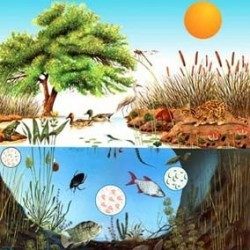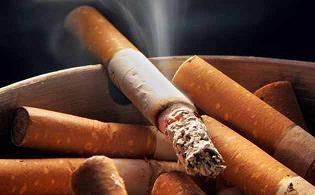Glossary
Ecology: Part of the biology that studies the relationships of living beings with each other and with the environment in which they live.
Environment: It is the set of physical, chemical and external components with which living beings interact.
Habit: Habitual practice of a person, animal or community.

Water: Liquid substance without smell, color or flavor found in nature in a more or less pure state forming rivers, lakes and seas.
Earth: It is a planet of the solar system that rotates around its star the Sun in the third innermost orbit.

Healthy life: Good health habits can allow you to avoid illness and improve your quality of life.
Health: State in which a living being or organism does not have any injury or suffer from any disease and exercises all its functions normally.
Natural resources: a good or service provided by nature without alterations by the human being.

Planet: celestial body that:.Orbit around a star or remnant of it.

Nature: Set of things that exist in the world or that are produced or modified without human intervention.
Ecosystem: Biological system constituted by a community of living beings and the natural environment in which they live.

Protection: Action to protect or prevent a person or a thing from receiving damage or from reaching something that produces it.

Saving: Amount of money, goods or other thing that is saved.

Energy: Capacity that has the matter of producing work in the form of movement, light, heat, etc.
Alcohol: Drink containing ethyl alcohol.
Tobbaco: Leaf of this plant that, cured and prepared, is smoked, chewed or aspirated in the form of snuff.

Industrialization: Submission of a product or an economic activity to the organized exploitation of the industrial process.

Diet: Control or regulation of the amount and type of food that a person or an animal takes, usually for a specific purpose.

Weather: Set of atmospheric conditions typical of a place, consisting of the amount and frequency of rainfall, humidity, temperature, winds.
Prevention: Measure or provision that is taken in advance to avoid the occurrence of something considered negative.

Disease: Mild or severe alteration of the normal functioning of an organism or of some of its parts due to an internal or external cause.

Physical exercise: any physical activity that improves and maintains the physical fitness, health and well-being of the person.

Nutritionist: He is a professional specialized in the properties and characteristics of food and its interaction with men in health and disease.
Malnutrition: Loss of reserves or weakening of an organism by receiving little or bad food.

Trash: Set of rubbish, sweepings, materials, etc., that are discarded, such as food waste, old papers and rags, pieces of broken things and other waste that are produced in the houses daily.

Contamination: Action to contaminate.

Deforestation: Extinction of the forest plants of a land.

Greenhouse gas: It is an atmospheric gas that absorbs and emits radiation within the infrared range.
Waste: Any material that its producer or owner considers to be of insufficient value to retain it.

Risk: Possibility of a mishap or misfortune, of someone or something sufering harm or damage.

Fauna: Set of all animal species, generally with reference to a specific place.

Flora: Set of plants of a certain area or geological period.

Biosphere: Is the system formed by the set of living beings on planet earth and their interrelationships.

Lifetime: Property or essential quality of animals and plants, by which they evolve , adapt to the environment , develop and reproduce.

Acidification: Increase in acidity.

Harmful agents: Substances that are released into the environment in inappropriate concentrations pose a danger to the biocoenosis and the biotope.

Farming: Related to agriculture and livestock.

Air: Air is called the mixture of gases that make up the Earth's atmosphere, which remain around the planet Earth by the force of gravity.

Rural area: Space where the productive activities of the primary sector predominate, also containing the traces of transport systems, industrial facilities, electricity generation, population and services, all dispersed.

Consumpition: it is an alternative to the logic of mass consumption that is based on acquiring sustainable products.

Dirt: They provide oxygen to the atmosphere and, as a consequence , allow us to brathe.
Population: The census provides the number of inhabitants that each commune has. This data of one those that the Municipal Common Fund considers when distributing the resources to each municipality.

Idea: Is the provisional content or intuitive understanding than an individual has of a subject, issue or state of affairs.
Awareness: It is a judgement of the reason why man recognizes the goodness or badness of an act.
Fertilizer: Is any type of organic or inorganic substance that contains nutrients in forms assimilableby plants, to maintain or increase the content of these elements in the soil, improve the quality of the substrate at a nutritional level, stimulate the vegetative growth of plants.
Grass: Set of plants without trunk with green leaves, thin, short and dense, which is planted in gardens for ornamental reasons and on sports grounds to cover the ground.
Mud: Soft and compact mass of earth and water.
Bacterium: Unicelular microscopic organism, lacking a nucleus, which is multiplied by simple cell division or by spores.
Biology: Science that studies the structure of living beings and their life processes.
Healthy life
Leading a healthy
life allows us to prevent the risk of suffering from diseases, prolongs the
natural time of our lives and allows us to perform physical activity more
efficiently. For this reason, it is very important to know the activities and
habits that we must follow to achieve this objective.
Next, we will mention some daily
habits that should be taken into account to lead a healthy life:
-Exercise daily and control weight.

-Avoid the consumption of tobacco
and alcoholic beverages.

-Take only the medicines prescribed
by your doctor.

-Eat a healthy and balanced diet.
It is recommended to regularly attend the nutritionist.

-Perform a good toilet and dental
care.
-Carry good security practices.








